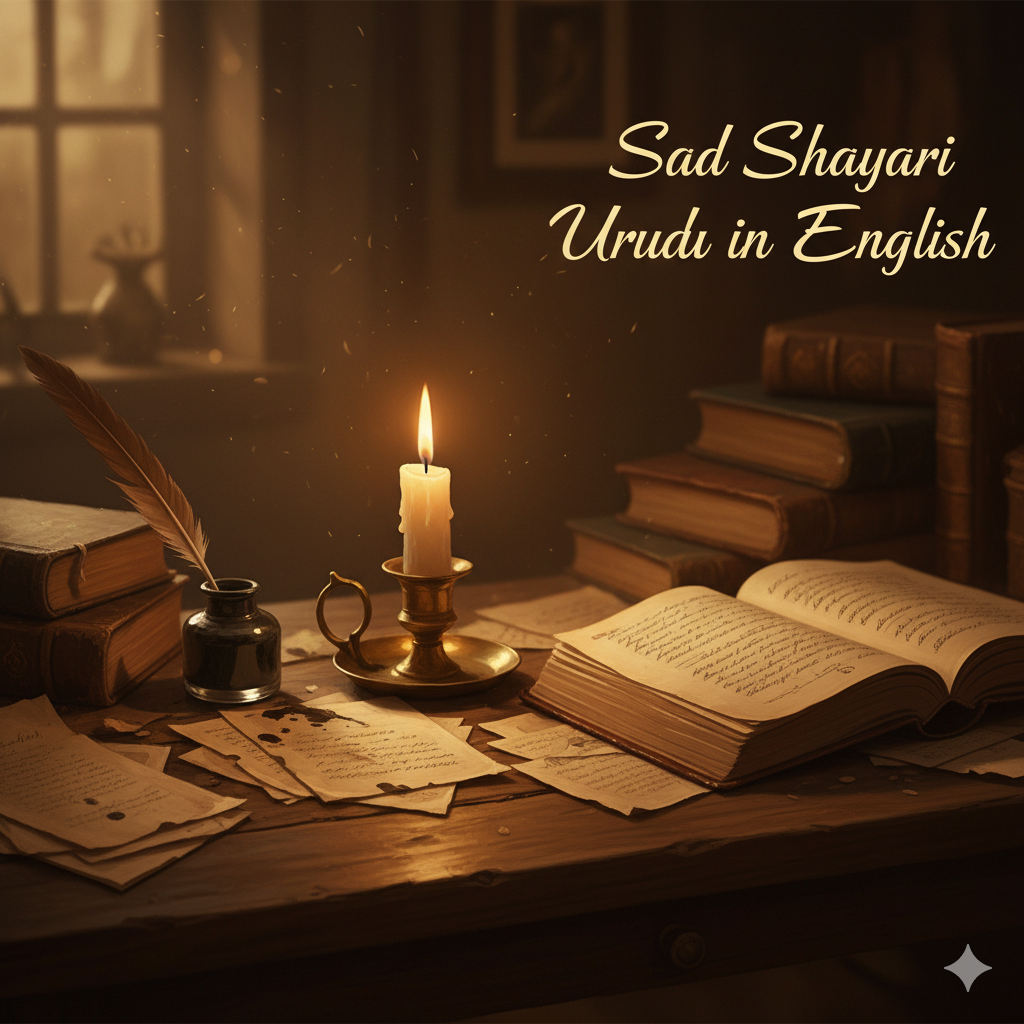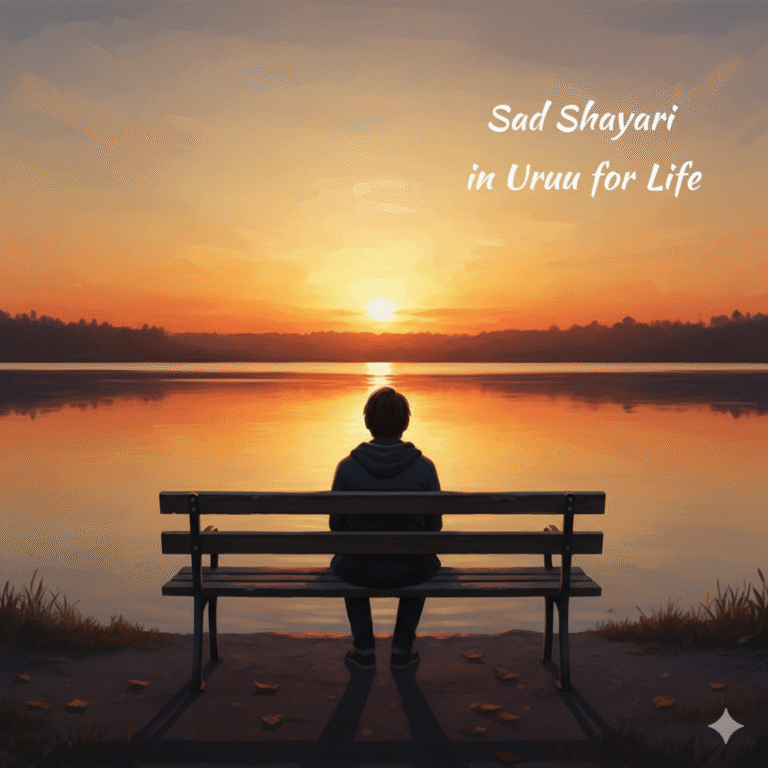The Soulful Appeal of Sad Shayari Urdu in English
Some feelings are too heavy for everyday words. You try to explain how much it hurts, but everything sounds small, fake, almost insulting to the pain. That’s exactly when sad shayari Urdu in English saves the day. It gives you the full, aching depth of Urdu poetry, but in letters you can actually type on your phone without changing the keyboard ten times. Same tears, same dard, same dil-torn feeling—just wrapped in English transliteration or a heartfelt translation so everyone can feel it with you.
For a lot of us, this is the only way we can still taste real Urdu poetry. We grew up hearing our parents recite Mirza Ghalib or watching old ghazal nights on PTV, but somewhere along the way we stopped reading the script properly. Roman English brings it all back home.

How Other Websites Serve Sad Shayari Urdu in English
I’ve spent too many sleepless nights scrolling, and here’s what I’ve noticed:
Full Urdu + English Translation Side-by-Side
Some sites put the beautiful Nastaliq script on one side and the English translation on the other. You cry in Urdu, understand in English—perfect combo.
Poet-Specific Sadness Sections
You’ll find entire pages dedicated to “Jaun Elia Sad Shayari in English” or “Parveen Shakir Heartbreak Poetry Translated.” It feels like walking into a room where only the saddest, most beautiful lines of that poet live.
Pure “Dukhi Shayari” Collections
Big headings screaming “Dukhi Shayari,” “Zindagi Shayari,” “Bewafa Shayari”—all with Roman transliteration so you can copy-paste and destroy someone’s evening in seconds.
Roman-Only Zones
A few websites just gave up on the script altogether and went full Roman Urdu. Instant copy, instant heartbreak, zero effort.
Mood-Off Specials
There are corners literally called “Mood Off Shayari in English Letters.” They know exactly what we’re doing at 2 AM.
The Kind of Pain That Keeps Showing Up
Classic Dil-Tootna
The usual suspect—love that left, promises that lied, memories that won’t shut up.
Regret That Follows You Like a Shadow
The “kaash ek baar keh deta” thoughts that wake you up at night.
Loneliness Even When the Room Is Full
When everybody is laughing and you’re smiling on the outside but dying on the inside.
Life Just… Not Living Up to the Hype
Dreams that turned into jokes, efforts that went nowhere, the quiet “bas ho gaya” moment.
Spiritual, Soul-Level Ache
The big questions—why are we here, why does everything hurt, where do broken people go when they die?
Memories That Hurt More Than the Present
Sometimes remembering the good days is the cruelest punishment.
The Final “Theek Hai, Rehne Do”
When you stop fighting the pain and just let it sit beside you like an old friend.
How They Make Simple Words Feel Like Knives
Metaphors that hit hard: broken mirrors, dying candles, rain that never stops. Personification on another level: yaadein walking behind you, khamoshi screaming, dard smiling politely. Sensory punches: cold beds, salty tears, the smell of old letters, silence so loud it hurts. Repetition that loops in your head like a sad song: phir wahi dard, phir wahi raat, phir wahi tu. Beautiful contradictions: your absence feels more real than your presence ever did.
And the best ones? They never give you closure. They just leave you hanging, exactly like real life.
Original Sad Shayari Urdu in English (Fresh Tears, 2025 Edition)
Meri tanhaai ne mujhe sikha diya hai Har dard ke tukde mein tera naam dhoondhna (My loneliness taught me to search for your name in every fragment of pain)
Woh yaad jo dil mein chhupi rehti hai Khamoshi mein bhi zor se chillati hai (That memory hidden in the heart—even in silence, it screams)
Maine apni zindagi tere khwaabon se sajaayi thi Tu chala gaya, aur saare khwaab adhure reh gaye (I decorated my life with your dreams—you left, and every dream stayed incomplete)
Raat bhar teri baaton ka intezaar karta hoon Subah hoti hai, aur dil phir se toot jata hai (All night I wait for your words—morning comes, and the heart breaks again)
Teri khamoshi ne mujhe andhera sikha diya Ab har roshni mein bhi dard nazar aata hai (Your silence taught me darkness—now I see pain even in light)
Zakhm toh purane ho gaye hain Par unki yaadein ab bhi taaza hain (The wounds have healed, but their memories are still fresh)
Duniya kehta hai bhool ja usse Par dil poochta hai—kaise bhooloon khud ko? (The world says forget them—but the heart asks, how do I forget myself?)
Main jee toh raha hoon har roz Par sach kahoo toh mar chuka hoon uss din (I’m living every day, but honestly—I died that day)
Why This Version Hits Different
Because it feels like sneaking real Urdu poetry into an English-speaking world. Because your friend who never understood “ishq” finally gets why you’re broken. Because you can text “dil toot gaya” and they’ll actually feel it. Because sometimes you just want to speak in your mother tongue’s soul, even if your fingers only know English letters.
The Healing Side (and the Dangerous Side)
These lines have pulled me out of some very dark nights. Typing a sher and watching someone reply “felt” feels like a hug from a stranger who gets it.
But you can also drown in them. You can start believing pain is your only identity. You can keep rereading the same couplet until it becomes a cage instead of a window.
So use them. Cry to them. Post them. But don’t move in permanently.
How to Write Your Own Sad Shayari Urdu in English
- Sit with the exact moment that still hurts.
- Close your eyes and let one image come: rain, a locked room, a dead phone, anything.
- Start writing in whatever language comes first—Urdu words, English words, doesn’t matter.
- Keep the words that sting. Delete the ones that don’t.
- Repeat the word that hurts the most: dard, yaad, khamoshi, tanhaai.
- Put something beautiful right next to something broken. That contrast is everything.
- Don’t force a happy ending. Some stories just stop in the middle.
- Read it out loud. If your voice cracks, it’s ready.
Where You’ll Find It Thriving Today
Your 3 AM Instagram story with white text on a black screen. That WhatsApp status your ex will definitely see. The YouTube lyric video with a million crying emojis. The group chat where everyone just drops a couplet and disappears.
FAQs About Sad Shayari Urdu in English
Is it less “real” than proper Urdu script? Not even slightly. The tears are the same.
Why do we even need it in English letters? Because most of us type faster in English and cry slower in Urdu script.
Does it help when you’re actually sad? More than therapy sometimes. Less expensive too.
Any danger? Only if you start living inside the pain instead of just visiting it.
Can I write it even if I’m not a poet? The best ones were never written by “poets”—they were written by people who were bleeding.
Final Thought
Sad shayari Urdu in English is what happens when an ancient soul learns to speak with a modern tongue. It’s our grandmothers’ ghazals living inside our phone keyboards. It’s proof that no matter how far we travel, some aches only make sense in the language our hearts were born speaking—even if we have to borrow English letters to say it.







